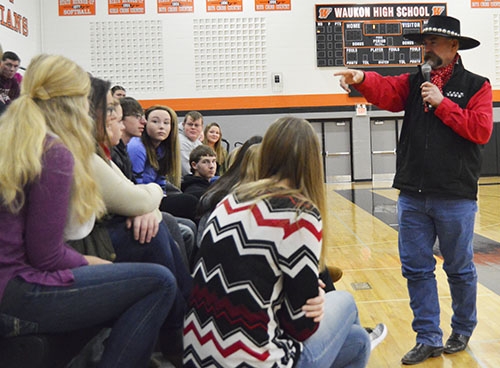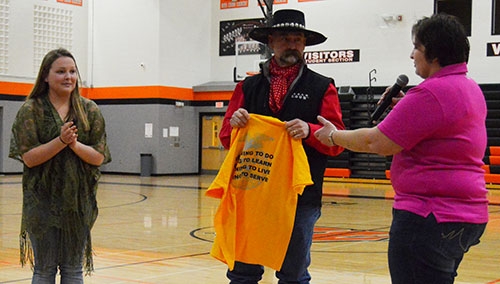You are here
Home ›Trent Loos visits with Waukon High School FFA students

Radio host Trent Loos visits Waukon High School FFA ... Nationally syndicated radio host Trent Loos, famous for the “Rural Route” radio show and “Loos Tales” podcast, visited Waukon High School FFA students November 10 to discuss a variety of agriculture related topics. Standard photo by Joe Moses.

Trent Loos presented Waukon High School FFA t-shirt ... Nationally syndicated radio host Trent Loos was presented a Waukon High School FFA t-shirt during his visit with FFA students. Pictured left to right, FFA member and Waukon High School student Cayla Nolting, Trent Loos and FFA Advisor and Ag Instructor at Waukon High School Jessica O’Connor. Standard photo by Joe Moses.
by Joe Moses
Syndicated radio host Trent Loos, a sixth generation farmer from central Nebraska, visited Waukon High School November 10 to speak with FFA students regarding a variety of agriculture related topics.
Loos, famous for his nationally syndicated radio show “Rural Route” and his podcast “Loos Tales,” discussed misconceptions related to farming and agriculture. Loos questioned the FFA students about how they would define agriculture and received a range of answers dealing with the production of crops and livestock and in general terms, the use of nature for the continuation of mankind.
Loos expanded upon the general definition by commenting that agriculture is involved with or benefits most aspects of our lives. Loos discussed that beyond the food that we eat, agriculture is involved in most of the products that we use on a daily basis with components of many things coming from animals and agriculture.
Loos questioned the students about misconceptions in agriculture, receiving a response from a student that farmers are doing more harm than good. In response to that misconception, Loos discussed that modern farming practices involve the responsible use of resources while preserving the environment.
Loos discussed concerns with agriculture’s effect on water quality, citing that northeast Iowa has 49 healthy, vibrant trout streams which indicates good farming practices are in place protecting groundwater and health of rivers and streams.
Loos discussed advances that have been made in agriculture, including crop farming with five acres of land in 1900 being required to feed one person for a year and only one-third of an acre today being required to produce the same amount of food.
Loos indicated that animal production has seen substantial increases as well and in looking at recent history, the 1995 average of 16-18 piglets per sow is much less than the modern day 30 piglets per sow, which is becoming more common in the industry. Loos discussed herd health being better than ever with increased beef and milk production through stockmanship and the minimization of stress, all of which have increased production levels.
Loos discussed that there are many opportunities to get into farming and agriculture with the average age of farmers being 60 years and above. Loos told students that many of these farmers may not have a family member that is interested in continuing the farming business and that opportunities exist to partner with or purchase an existing farming operation. Loos discussed that individuals at all skillsets and levels of experience are needed in agriculture, including those from technical fields like mechanics as well as those from a business or accounting background.
Loos discussed agriculture from a global perspective and the opportunities that exist to export food to other countries. Loos used Japan as an example that has potential to be a greater market for U.S. grown animals and crops. With a population of approximately 130 million in a country the size of California that is 70% mountainous, Loos discussed opportunities exist for greater exports there and elsewhere in the world.

